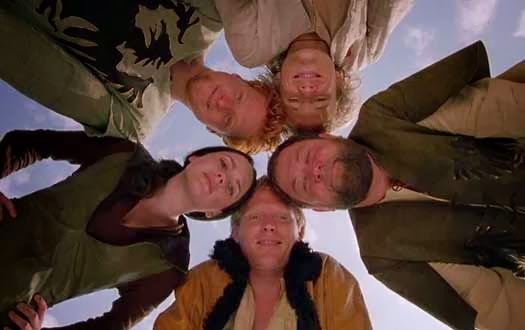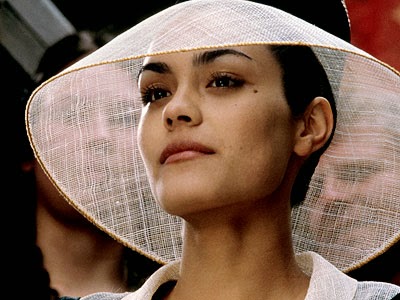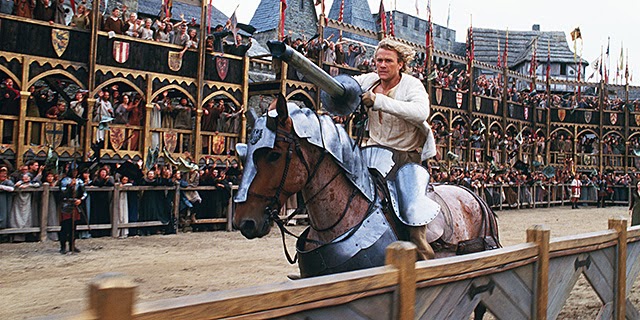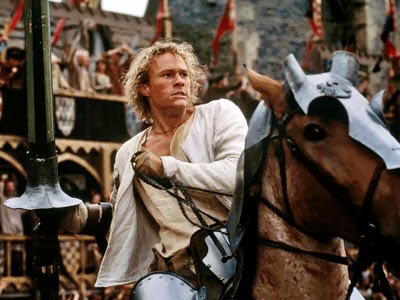If you grew up in the nineties, or if you had a pulse then,
let’s be real, you probably remember when A
Knight’s Tale came out. It starred a young Heath Ledger, hot off the also
epic and amazing 10 Things I Hate About
You, and I don’t know anyone who wasn’t super pumped to see him jousting
and speaking with an English accent and being all medieval. And then we saw the
movie. It was…not what we expected.
But not in a bad way. I’ve heard a lot of people who fondly
reminisce about the first ten minutes of the film, where they were so confused
because we were all expecting a warm, fuzzy traditional hero story, and what we
got was Queen, sing-a-longs, classic rock, and naked Paul Bettany. It was a
little surprising.
And the movie itself got a lot of accolades, not just for
being possibly the funnest thing ever (still true), but for being revolutionary
and daring. After all, it’s the story of a poor boy who dreams of becoming a
knight and decides to make his dreams come true, even though he could die if
anyone finds out, and even though he faces extraordinary obstacles and he has
to learn how to joust and he’s not actually very good at being a nobleman.
William Thatcher (Ledger) wants to joust and “change his stars”, and that’s
exactly what he does. Yay!
Only as we all got older, it became increasingly apparent
that while A Knight’s Tale is still
the most stinking fun you can have in a movie theater (Alan Tudyk for the win),
and it had a crazy talented cast (seriously, all of those people went on to do
super awesome stuff), the story itself really wasn’t all that revolutionary. At
least not when it comes to class.
You see, the story is about William Thatcher, a nice young
man who is sold in service to an aging knight to be his squire and make his
fortune. Young William grows up on the road with the knight and his other two
squires, Watt (Tudyk) and Roland (Mark Addy, also from Game of Thrones). One day the old knight dies right before a
tournament, and while Watt and Roland are kind of happy, because it means they
can go home, William is angry. He’s hungry, they have no money, and they’re
stuck in the middle of nowhere France.
So he hatches a terrible, impossible scheme. He will dress
up in the knight’s armor and joust for him, which will win them the tournament,
as long as he doesn’t fall off the horse, and then they can use the tournament
prize to buy food or go home or anything.
It works, and William is hooked. He convinces Roland and
Watt to keep the scam going. He can pretend to be a knight, and he’ll learn how
to joust, and they can enter in tournaments and make lots and lots of money.
Foolproof, right? Except for the part where William is terrible at being a
nobleman, and they don’t have any papers or proof that he’s really who he says
he is, and his armor is crap and all that. Some of these problems are more
fixable than others.
For example, they happen upon Chaucer (Bettany) in the road,
having succumbed to gambling debts, and agree to give him some clothes and a
ride on the horse in return for proof of Will’s nobility. Naturally, Chaucer
sticks around through the rest of the film. Along the way they also meet Kate
(Laura Fraser), a blacksmith who makes the best armor in the land and becomes
Will’s personal armorer. And then he meets Jocelyn (Shannyn Sossamon), a
noblewoman who entrances and entices Will. He falls for her, and the movie’s
pretty self-explanatory from there on out.
Oh, and there’s a bad guy, Lord Adhemar (Rufus Sewell), who
also wants Jocelyn and who is a right dick, but the whole thing really follows
a pretty standard sports movie script. Sure, it’s kind of weird because it’s
set in the middle ages, and, again, it’s a Queen soundtrack, but whatever. It’s
awesome.
The thing is, while you want to look at this as some kind of
class warfare, or as a victory for the people when Will, in the end, is allowed
to joust, it really isn’t. And that kind of stinks.
Will gets found out eventually, because of course he does,
and he is sent to the stocks, but his crew stands with him and it’s all very
heartwarming, and then Prince Edward Colville (James Purefoy), the Prince of Wales shows up.
Will earned his respect earlier in the film when he didn’t refuse to joust
against him (everyone else withdrew because you can’t joust at royalty), so the
Prince is here to see what’s up. And he decides that since Will is such a nice
guy, he’s going to save him.
Only he saves Will by making an announcement: Will’s family
is actually one that is long ago descended from the royal line, which makes
Will actually a nobleman, and therefore he wasn’t lying and can totally joust
in the big tournament. Yay!
Or not. Because let’s think about this for a second. The big
reveal, the saving moment, is when there is a deus ex machina that doesn’t
destroy the class system in place, but rather enforces it. Yay, Will can joust,
but only because Colville was willing to lie and say that he’s of royal
blood. If he weren’t, he wouldn’t be able to joust. So the common man still
can’t participate. They still have fewer rights. So, it’s actually not
revolutionary at all.
Well, it’s not revolutionary at all with regards to class. It is pretty surprising with regards to
something else: gender. That’s right. This movie? Secretly kind of awesomely
feminist.
Let’s roll it back. Remember Jocelyn, Will’s lady friend?
Well, one of the more defining things about her character, insofar as her
character has defining traits (she’s a pretty standard movie girlfriend), is
that she loves fashion and dances and parties and girly stuff. And that’s cool.
Her costumes are pretty awesome, and the scene where they dance to David Bowie
is super rad.
But there’s a scene right after Will’s won another
tournament that really makes you realize that Jocelyn, bland character that she
is, is kind of stinking awesome. So, Will’s just won the tournament, but he
only won because Adhemar withdrew (because he wouldn’t joust against the
aforementioned Colville), and Will is pissed. He really wants to beat
Adhemar. So he’s storming around, throwing what can only generously be referred
to as a tantrum.
Jocelyn comes up, all excited about the ball, and Will lays
into her. Insults her. He takes out all of his rage and frustration on her,
complaining that she’s so obsessed with dresses and balls and stupid stuff, while
he’s over here, thinking about what really matters. It’s disgusting and
annoying, but it’s pretty standard movie stuff, let’s be real.
What Jocelyn does next, however, is not standard movie
stuff. Instead of apologizing or crying or even screaming at him, Jocelyn just
looks at Will very calmly and says, “Better a silly girl with a flower than a
silly boy with a horse and a stick.”
I want you to think about that for a moment, because while
on the one hand it is a pretty sick burn, it’s also a freaking shocking
statement to come out of a movie that is otherwise a perfectly comfortable
masculine sports movie with traditional gender roles. This one line, this line
where we as the audience are meant to be appalled at Will’s behavior and
rooting for Jocelyn, subverts the entire idea of the movie itself: namely, that
it is somehow important that Will win
these tournaments.
In one moment, Jocelyn reminds him (and us) that no, it’s
really not.
More than that, though, Jocelyn challenges and shuts down
the idea that his pursuits are more worthwhile than hers. She speaks out
against the idea that because Will is doing something traditionally masculine,
that his efforts are more important than her love of dresses and social events.
Jocelyn is challenging the idea that
masculinity is inherently worth more than femininity.
Because, when you think about it, it’s totally true. Yeah,
Will loves jousting and by jousting he’s supporting his friends and making a
living and getting to do something he’s good at and enjoys.
Well, Jocelyn loves parties and dresses and social stuff.
She’s good at it. Hell, she’s used
her party magic to save Will’s ass before, thus keeping him from being a
laughingstock of the jousting circuit and keeping him from being a target of
investigations into his heritage or people who just plain don’t like him. If
you look at the movie, Jocelyn is actually a more effective figure than Will.
She’s the one who saves him from public humiliation (and
possible imprisonment). She’s the one who goes to rescue his father and bring
him to Will’s tournament. Jocelyn is, in fact, the more powerful of the two.
She’s the one with political know-how, and she’s the one who has the
connections to get Will freed. Oh, and there's this tiny little thing where she knows her own worth. Like, really well.
The concept of the plot, in general isn't super feminist, but it takes a surprising turn. Jocelyn has come back to the tournaments because she's mostly forgiven Will, but not totally. They meet, and he stumbles all over himself trying to convince her that he will win the tournament for her. She (rightly) points out that literally every man has promised to win for her. What she wants is someone who will lose for her.
Think about it for a second. She's asking him to damage his life and livelihood by proving his love to her. On the surface, that sounds kind of sadistic and like a terrible girlfriend. But what it really says is that she knows exactly what she is worth.
For Will to promise that he will win for her does nothing for Jocelyn. Will wants to win anyways, so saying he's going to do it for her doesn't mean crap. It's nice and all, but it shows zero commitment. For Will to lose, however, goes against all of his previously held values. If he loses, and loses in her name, then he's actually putting her needs ahead of his own, and therefore is a worthy mate. Because remember, up to this point, it's pretty much all been on Jocelyn's side. Oh yeah, Will's been pursuing her, but Jocelyn is the only one with something on the line in this relationship: her future. If she's tied to Will and he turns out to be a dud, she's screwed (thanks, patriarchy). Jocelyn pretty understandably wants to make sure Will is all he says he is.
That scene, paired with the other one, gives us a pretty cool view of Jocelyn as a character. She's interesting. She's complex. And she knows a whole lot more about what's going on her than it seems at a first glance.
Also, it is nice to see a female love interest in a period piece who isn't white as the driven snow? Sossamon, who plays Jocelyn, is of mixed ancestry, but some of it is distinctly non-white, and the fact that it's in the film, but never really mentioned or made a thing of is cool. She's still the most beautiful girl, and all the men want to have her, even though she doesn't actually fit the usual ideal of medieval beauty. (And, as a sidenote, Berenice Bejo plays her handmaid, who is rad, and also Latina. Just saying.)
The plotline about the jousting and Will losing to prove his love is great, even if it does rather immediately get jossed so we can get back to the main story. (Jocelyn comes back as Will is losing and demands that now he win for her!). The point, however, stands. Jocelyn is an awesome character, but she's one that we've been trained to disdain, because she's unabashedly feminine. Because Jocelyn actually enjoys parties and dressing up, we’re normally
allowed to think of her as silly or useless, as opposed to Kate, who is a
blacksmith, a traditionally masculine job, and something “useful”.
In fact, they’re both useful, and they’re both important.
Jocelyn isn’t worth less than Kate or Will because the things she likes are
girly, and Kate isn’t worth less than either of them because her work is manual
labor. When Jocelyn lays the smackdown on Will, and then follows it up by
ignoring the ever-loving crap out of him for a few months, as a feminist I feel
happy. She’s saying the thing. She’s pointing out what we’re all too blinded by
the movie to realize: that Will’s dream is just as stupid as hers.
For me, this little moment redeems a lot in the movie. It
saves the fact that this is a film that doesn’t pass the Bechdel Test, that cut
one of the only female characters completely out of the film (Olivia Williams
as Chaucer’s hilarious wife), and that Jocelyn, for all her moments of feminist
awesomeness, is a pretty bland character.
This single moment makes the movie what it always claimed to
be: revolutionary.
 |
| If you don't like this movie, I'm not sure we can be friends. Sorry. |







Well written. ..you caused profound revelations! Thank you kindly
ReplyDeleteGlad you liked it!
DeleteA Knight's Tale is a great film but the Jocelyn subplot was the worst part, as she is a pretty unlikable character and the actress doesn't sell her too well. Regarding the part of the film where he begins to intentionally fail to prove his love, it was obviously a mistake on the part of the writer and director. It brings the film to a screeching halt and makes everyone groan while regarding Jocelyn as seeming petty. I don't personally believe a man should have to shirk his values entirely to prove his love to a woman, but rather that two people who care about one another should be able to understand and accept each other's values, and integrate them into one another. Jocelyn showed that she put herself above values that William obviously established over a difficult life time on the road, for no particular discernible reason. Perhaps she wanted William to prove he was different from the other lords and knights, but that much should've been obvious already. If anything, the best thing that part of the film establishes is that Jocelyn has a fault, that she is, like William, an ordinary person who underneath the beauty and nobility was just as insecure and sometimes even as petty as William could be, but that their love could withstand that.
ReplyDeleteFraser's role was a much fresher drink of water, as Kate.
I've read once in wiki, i think. That the movie received criticism on how the narrative seem to favor a princess over a hardworking woman who is also feminine and supportive. But i think they removed that part. I'm trying to look for that writing again but i can't seem to find it.
DeleteI really, really hated Jocelyn. I adored Kate, she was a strong female character. But Jocelyn seemed to rude, cocky, and just straight up unlikable. "If you love me you'll lose for me" Really? Make a Knight lose a battle- and this battle is basically his job, his livelihood, AND it HURTS to get hit ya know! I wish she wasn't apart of it at ALL, she added nothing to the story at all honestly.
ReplyDeleteShe is too cocky and full of herself, and did not belong in the movie at all. Even if this article says she was good and had a few good lines- honestly she doesn't.
Yes exactly! I wish she was written better! Yes we can have Kate the 'strong and independent' type alongside with jocelyn the traditional feminine beauty, and we can have them both to be just as great. But the way this movie writes her? This ain't it.
DeleteI get the point of the blog's author but no matter how the fact it is, i still CRINGE so badly whenever jocelyn's screentime is on! It's such a dilemma bc i love Knight's Tale with all its cheesy medieval charms and inaccuracies, but feminine women can at least be written as feminine with values without being ever so.. 'princessy'in a bad way
It might be bc i'm viewing this with the lens of a modern woman but I still can't stand the fact she still has the potential to jeopardize what William and his friends- the low class with barely any chance to better their lives- to fail something they've been working hard for. Call me close-minded but i still prefer their banters and fights not to he so childish and diva-ish
Beautifully written! I agree whole-heartedly with your take on Jocelyn. She is a strong and unconventional twist within the realm of girlfriend role. She’s as important as Kate, and the scene in the church where she challenges Will is pivotal. She says that HIS version of what she wants shouldn’t be the end-all definition of what she wants: what a gorgeous allegory to more complex social norms being set for women by men. Thank you!
ReplyDeleteBeautiful young woman
ReplyDeleteAlthough jocelyn is still a character i dislike, i do appreciate the points that you brought. There is no need to have team Kate or Team jocelyn bc we (well in this particular case, maybe not me) can like both equally. My favorite was always Kate bc she's easy to like and feels like your typical woman you meet everyday, and I feel how hardworking women also should be valued and still deemed as worthy of love (but maybe this is not the case since Kate still holds her deceased husband dearly in her heart).
ReplyDeleteBut speaking of Jocelyn, your writing made me realize that her character does have values. What I like about her is how she doesn't care about William's true peasant origins and she even sit beside his father during the last match. Jocelyn, no matter how you like her or not, is in fact a 'ride or die' kind of woman. That part, i noticed by myself while watching the movie on its own.
That being said, I still really don't like the way she's introduced as Will's love interest and how their relationship was written. That made me realize, maybe it's not jocelyn and her feminine values itself that annoy me, it's the romantic subplot that was just written so... cringey.
I don't know if medieval people were so cheesy or the writers just tried to troll us with cringey romance cliches. Maybe it's bc i typically like hetero ships that are written and played differently. Will is amazing by his own, Jocelyn is good as her own, but whenever they are together I just CAN'T stand them!
In the end, i want to thank your writing for making me realize that Jocelyn really isn't that bad. My feelings towards the romance subplot still doesn't change tho. But this time i will be more appreciative of all the characters whenever i watch the movie again.
In other words: it's not the characters that are annoying! It's the ship!
"William is amazing as his own"
DeleteOkay this is me again and i would like to edit to he's only 'good' and not 'amazing' to prove they're in the same level of esteem from my viewpoint